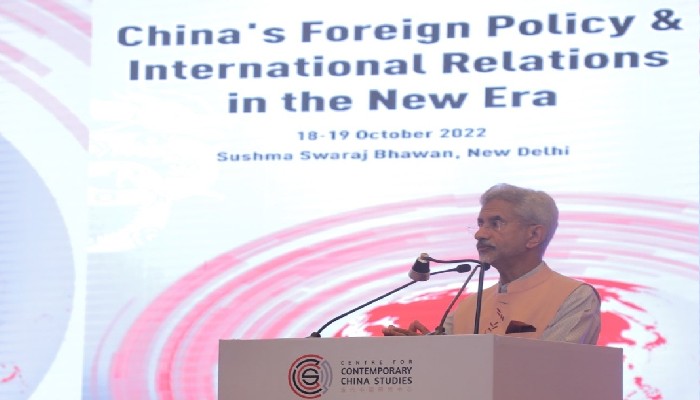The last few years have been a period of serious challenge, EAM Jaishankar noted
Peace & tranquility in the border areas clearly remains the basis for normal relations between India and China, External Affairs Minister S Jaishankar said on Tuesday, adding that this has been "mischievously conflated" with the sorting out of the boundary question from time to time.
He was delivering the keynote address at a conference by Center for Contemporary China Studies (CCCS) on “China’s Foreign Policy and International Relations in the New Era”. The remarks come in the backdrop of the standoff between India and China in the Eastern Ladakh region and ongoing talks for further disengagement.
According to EAM Jaishankar, India’s search for a more balanced and stable relationship with China take it across multiple domains and many options. Given the developments of 2020, they obviously focus on an effective defence of the border, he pointed out.
"Peace and tranquility in the border areas clearly remains the basis for normal relations. From time to time, this has been mischievously conflated with the sorting out of the boundary question," he stated.
He went on to say that "the truth is that the prerequisite has been and remains one much more modest; and even that was breached in 2020."
The last few years have been a period of serious challenge, both for the relationship and for the prospects of the continent, EAM Jaishankar noted. "The continuation of the current impasse will not benefit either India or China. New normals of posture will inevitably lead to new normals of responses," he stressed.
Establishing a modus vivendi between India and China after 2020 is not easy, he noted, adding that this was, however, a task that cannot be set aside. "This can only become sustainable on the basis of three mutuals: mutual respect, mutual sensitivity and mutual interest," EAM Jaishankar pointed out.
According to him, it is the willingness to take a long-term view of their ties that the two countries must display today.
In the course of his address, EAM Jaishankar also pointed out that Indian policy in the past has exhibited a remarkable degree of self-restraint that led to the expectation that others can have a veto over its choices.
"That period, however, is now behind us. The ‘new era’ is apparently not just for China," he remarked.
Looking back at seven decades of engagement, it would be fair to state that India has essentially taken a determinedly bilateral approach to China, he pointed out. According to him, the reasons for this included a sense of Asian solidarity and a suspicion of third party interests that emanated from other experiences.
Internationally, building deeper relationships and promoting better understanding of its interests strengthens India, EAM Jaishankar said, adding that "we must prepare to compete more effectively, especially in our immediate periphery".
 Contact Us
Contact Us  Subscribe Us
Subscribe Us









 Contact Us
Contact Us
 Subscribe
Subscribe
 News Letter
News Letter

